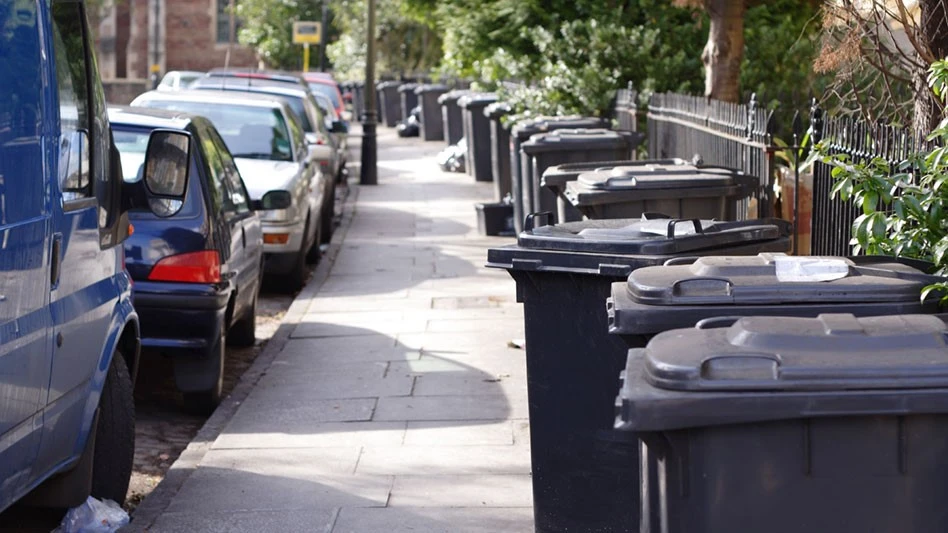
© Stuart Key | dreamstime.com
The city of East Lansing, Michigan, has joined the Michigan Department of Environment, Great Lakes and Energy (EGLE); The Recycling Partnership, Falls Church, Virginia; and almost 100 other Michigan communities to help residents recycle a greater quantity of material more efficiently.
Starting in September, a six-month pilot project began with involvement from the city, EGLE, The Recycling Partnership; Prairie Robotics, Regina, Saskatchewan; and The Ohio State University, Columbus, Ohio.
The project is a modified version of The Recycling Partnership’s Feet on the Street cart tagging initiative—a communitywide project to improve the quality of recycling in curbside carts by providing residents with personalized, real-time curbside recycling education and feedback. Traditionally, this is done by someone tagging carts on the street if contaminants are found within.
In East Lansing, instead of someone reviewing contents and placing a tag on curbside recycling carts, Prairie Robotics will retrofit the city’s recycling collection trucks with camera technology. Those cameras will document whether contamination enters the recycling cart, and residents will receive a mailer with information about what and how to recycle correctly.
“Recycling is not only the right thing to do but also the smart thing to do,” East Lansing Environmental Specialist Cliff Walls says. “We are excited the city was selected for this first-of-its-kind project in the U.S. by EGLE, The Recycling Partnership and Prairie Robotics. Recycling properly saves our taxpayers money by reducing costly damage to equipment as well as the expense of sending contaminated, otherwise recyclable material to the landfill. We know residents want to recycle the right way and, through this campaign, we are providing them feedback to do just that.”
Through $28,000 in grant funding and technical support from The Recycling Partnership, East Lansing will implement a comprehensive education and outreach strategy.
“The Recycling Partnership is excited to continue working with EGLE and Michigan communities to improve residential recycling across the state,” The Recycling Partnership Community Program Manager Cassandra Ford says. “On this project, in particular, in East Lansing, [with] the addition of Prairie Robotics technology and The Ohio State University providing statistical analysis on results, we expect to receive comprehensive conclusions on the effectiveness of combining camera technology with educational outreach to improve recycling.”
This year, more than $815,000 in grant funding is being allocated to 14 recycling program grantees, representing more than 369,000 households across Michigan. These 14 grantees are building on the impact of a 2021 project with a similar goal to improve recycling across Michigan, which reached 100 communities and expanded Michigan’s award-winning “Know It Before You Throw It” campaign, aimed at increasing the state’s recycling rate to 30 percent by 2025.
“EGLE is excited to continue working with The Recycling Partnership and Michigan communities to continue to improve residential recycling through these quality improvement projects,” EGLE Materials Management Division Recycling Specialist Emily Freeman says. “We all have a role to play in the circular economy, and these grants will help even more Michigan communities engage with their residents and improve the quality of recyclable materials collected in curbside and drop-off programs across Michigan.”
Developed by The Recycling Partnership, the traditional Feet on the Street program has been implemented in more than 70 communities around the nation, with some communities seeing as much as a 57 percent decrease of nonrecyclables in recycling and an average of a 27 percent increase in the overall capture of quality recyclables.
Latest from Recycling Today
- Aqua Metals secures $1.5M loan, reports operational strides
- AF&PA urges veto of NY bill
- Aluminum Association includes recycling among 2025 policy priorities
- AISI applauds waterways spending bill
- Lux Research questions hydrogen’s transportation role
- Sonoco selling thermoformed, flexible packaging business to Toppan for $1.8B
- ReMA offers Superfund informational reports
- Hyster-Yale commits to US production





